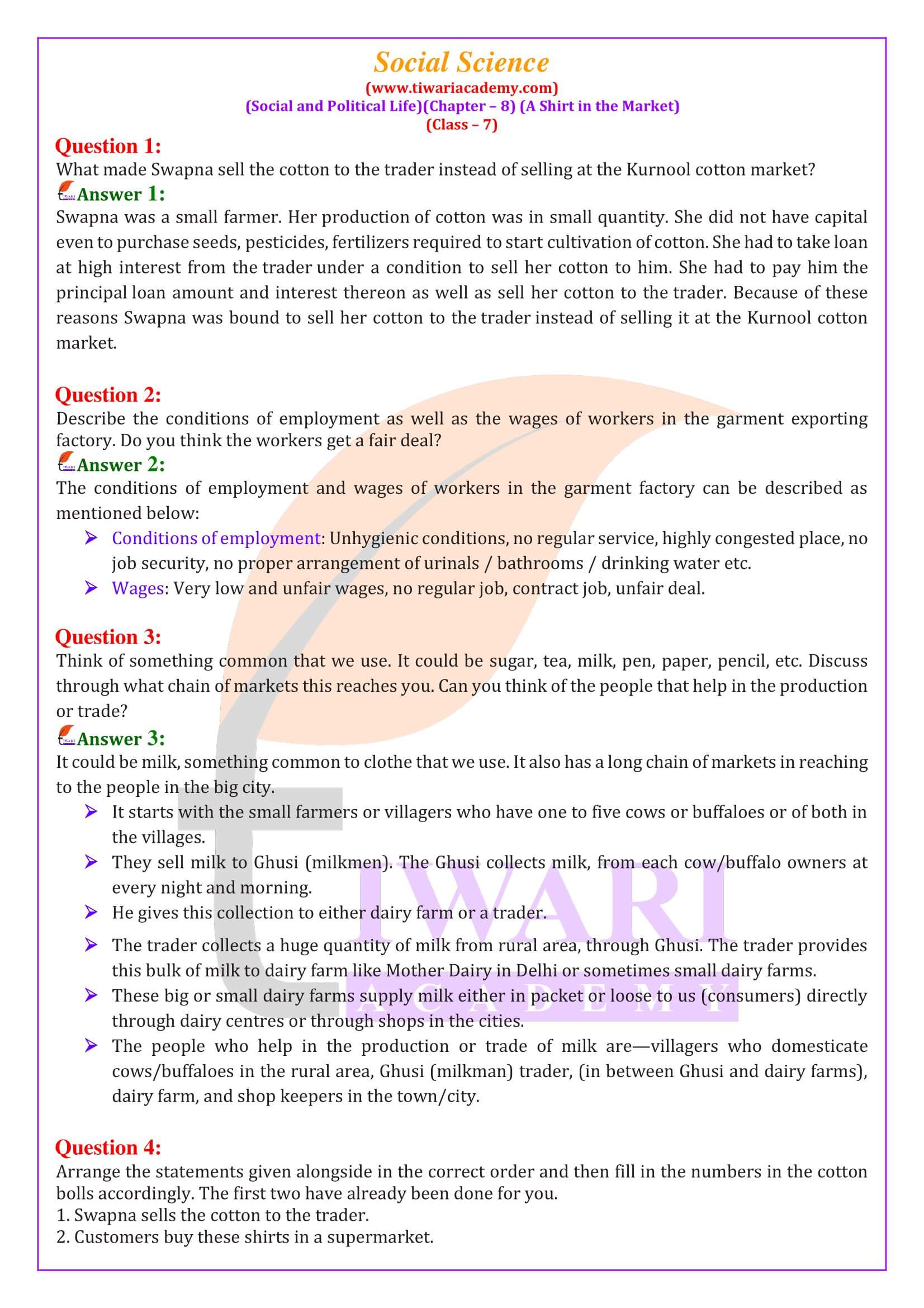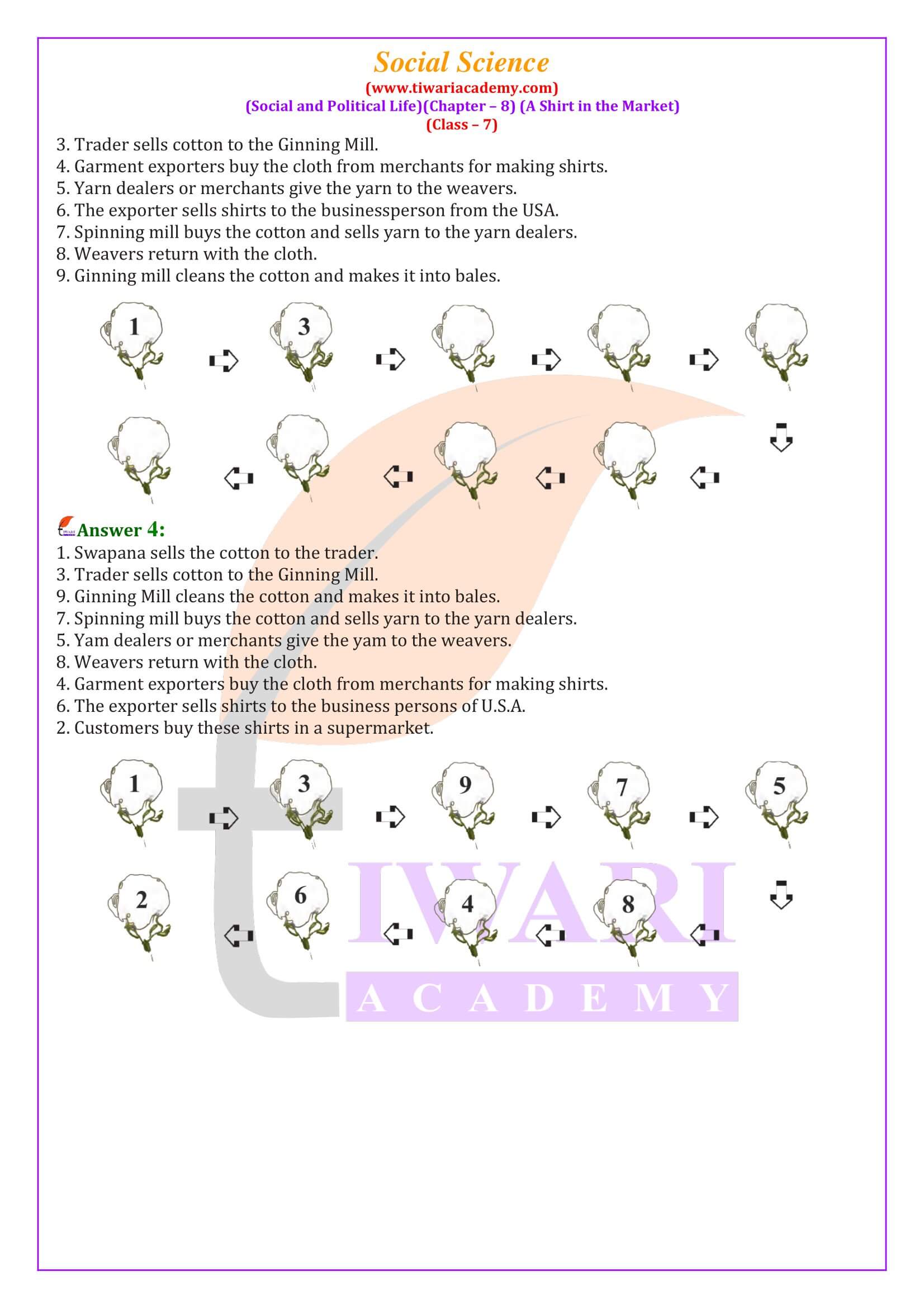NCERT Solutions for Class 7 Social Science Civics Chapter 8 A Shirt in the Market in English Medium and Hindi Medium free to download in PDF or View online updated for new academic session 2025-26. All the NCERT Solutions are updated for session 2025-26 based on latest NCERT Books. Join the Discussion Forum and ask whatever you want to know in Education. You are free reply the others also. Discussion Forum is the platform to express yourself.
NCERT Solutions for Class 7 Social Science Civics Chapter 8
Class 7th Civics Chapter 8 Solution in Hindi and English Medium
| Class: 7 | Political Science (Civics) |
| Subject: | Social Science |
| Chapter 8: | A Shirt in the Market |
| Session: | 2025-26 |
| Medium: | English and Hindi Medium |
Class 7 Civics Chapter 8 Question Answers
CBSE NCERT Solutions for Class 7 Social Science Political Science Chapter 8 A Shirt in the Market Unit 5 in Hindi and English Medium is given in updated format for the new academic session 2025-26. Download NCERT solutions Offline Apps 2025-26 for offline use or use Online Apps for iOS and Android.
How is cotton grown in the field?
Farmers grow cotton on their piece of land. The bolls of the cotton plant are ripe and some have already burst, so they pick the cotton bolls. The bolls, which carry the cotton in them, do not burst open all at once so it takes several days to harvest the cotton.
Frequently Asked Questions on 7th Civics Chapter 8
Class 7 Social Science Civics Chapter 8 Extra Questions
What are the main difficulties in growing cotton?
Cultivation of cotton requires high levels of inputs such as fertilisers and pesticides and the farmers have to incur heavy expenses on account of these. Most often, the small farmers need to borrow money to meet these expenses.
Describe Erode’s cloth market?
Erode’s bi-weekly cloth market in Tamil Nadu is one of the largest cloth markets in the world. A large variety of cloth is sold in this market. Cloth that is made by weavers in the villages around is also brought here for sale. Around the market are offices of cloth merchants who buy this cloth. Other traders from many south Indian towns also come and purchase cloth in this market.
What are the advantages for weavers in cloth making?
The merchant distributes work among the weavers based on the orders he has received for cloth. The weavers get the yarn from the merchant and supply him the cloth. For the weavers, this arrangement has two advantages. The weavers do not have to spend their money on purchase of yarn. Also, the problem of selling the finished cloth is taken care of. Weavers know from the outset what cloth they should make and how much of it is to be woven.
Cotton industry provides employment, but the poor farmers that grow cotton are still poor. Comment.
On one hand, the market offers people opportunities for work and to be able to sell things that they grow or produce. It could be the farmer selling cotton or the weaver producing cloth. On the other hand, it is usually the rich and the powerful that get the maximum earnings from the market. These are the people who have money and own the factories, the large shops, large land holdings, etc. The poor have to depend on the rich and the powerful for various things.
Class 7 Social Science – Civics Chapter 8 – Important Questions
Describe the conditions of employment as well as the wages of workers in the garment exporting factory. Do you think the workers get a fair deal?
The conditions of employment and wages of workers in the garment factory can be described as mentioned below: Conditions of employment: Unhygienic conditions, no regular service, highly congested place, no job security, no proper arrangement of urinals / bathrooms / drinking water etc. Wages: Very low and unfair wages, no regular job, contract job, unfair deal.
Think of something common that we use. It could be sugar, tea, milk, pen, paper, pencil, etc. Discuss through what chain of markets this reaches you. Can you think of the people that help in the production or trade?
It could be milk, something common to clothe that we use. It also has a long chain of markets in reaching to the people in the big city. It starts with the small farmers or villagers who have one to five cows or buffaloes or of both in the villages. They sell milk to Ghusi (milkmen). The Ghusi collects milk, from each cow/buffalo owners at every night and morning. He gives this collection to either dairy farm or a trader. The trader collects a huge quantity of milk from rural area, through Ghusi. The trader provides this bulk of milk to dairy farm like Mother Dairy in Delhi or sometimes small dairy farms. These big or small dairy farms supply milk either in packet or loose to us (consumers) directly through dairy centres or through shops in the cities. The people who help in the production or trade of milk are—villagers who domesticate cows/buffaloes in the rural area, Ghusi (milkman) trader, (in between Ghusi and dairy farms), dairy farm, and shop keepers in the town/city.
What made Swapna sell the cotton to the trader instead of selling at the Kurnool cotton market?
Swapna was a small farmer. Her production of cotton was in small quantity. She did not have capital even to purchase seeds, pesticides, fertilizers required to start cultivation of cotton. She had to take loan at high interest from the trader under a condition to sell her cotton to him. She had to pay him the principal loan amount and interest thereon as well as sell her cotton to the trader. Because of these reasons Swapna was bound to sell her cotton to the trader instead of selling it at the Kurnool cotton market.



